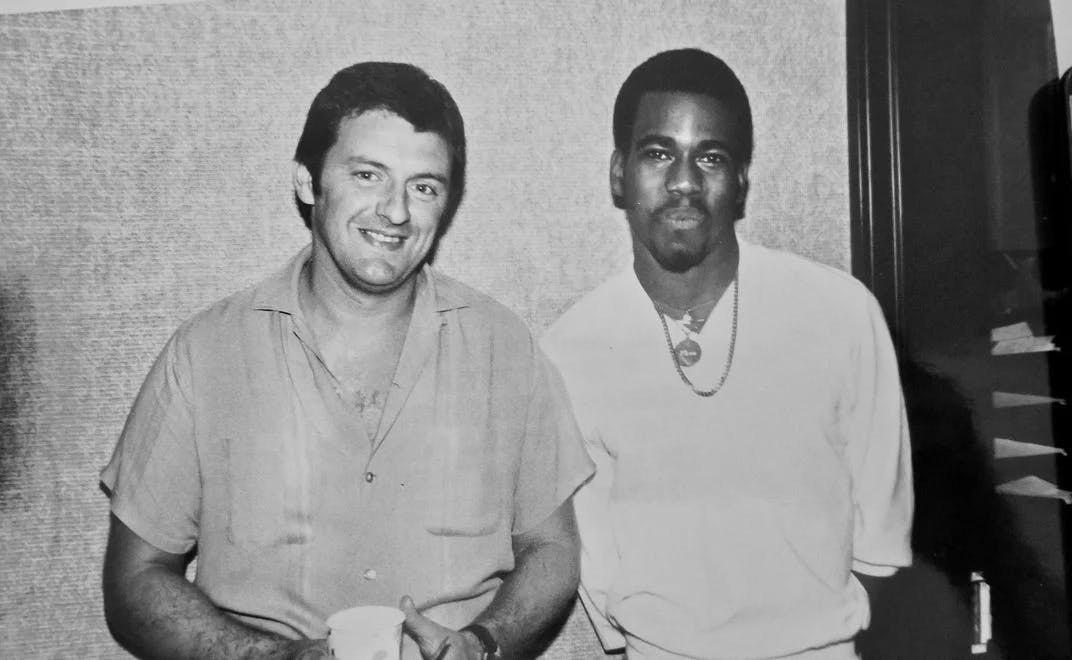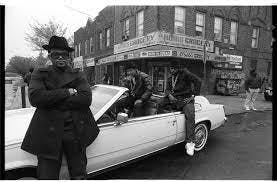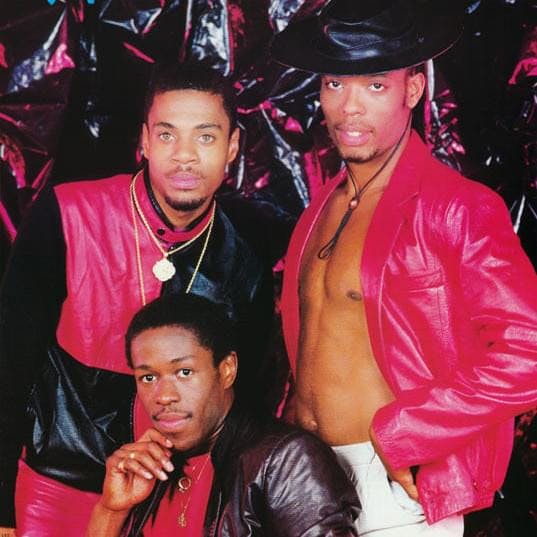
Larry Smith: Rap's First Superproducer
Larry Smith: The Genius of Rap's First Superproducer
By Jay Quan
Published Tue, May 10, 2022 at 11:00 AM EDT
The Beginning
The role of producer in Hip-Hop has changed a few times since the first rap records arrived at the end of the 1970s. In that era bands were attempting to re create the break beats that MCs and DJs were using before rap recordings. The people credited with production on those records were either the record label owners, or in some cases the musicians who arranged the songs. In the vein of what producers did in other genres of music, the rap producer also suggested additional musicians and/or producers, arranged and helped the artists to deliver the best vocal performance for the recordings in question. Larry Smith was a musician and multi-instrumentalist before rap records existed. He played on some of the very first rap records and was later responsible for recordings that caused a paradigm shift in the sound and direction of rap as a recorded medium.
The Jamaica Kats
Larry Smith was born and raised in St. Albans, Queens and was part of a burgeoning group of musicians who were merging elements of jazz and funk and called themselves the Jamaica Kats. The Kats consisted of Donald Blackmon, Tom Browne, Bernard Wright, Omar Hakim, Bobby Broom and they were mentored by jazz titans Weldon Irvine and Lenny White. As early as 1967, Larry was playing on records with a group called The Fire Bolts (Bernard Wright played with the Junior Fire Bolts) who were known for winning local battle of the band competitions. Smith also traveled with a band called Lighter Shade of Darkness, and released records with blues artist Jerry Washington.

Orange Krush
One of Larry Smith's high school friends was Danny Simmons, the older brother of party promoter Russell Simmons. Russell graduated from promoter to artist manager, and two of his early acts were a funk band called Orange Krush and an emcee who would become rap music’s first superstar, Kurtis Blow. Simmons helped Kurtis secure a record deal with Mercury/Polygram Records; the first major label deal for a solo rap artist. Smith played bass on Kurtis Blow's 1979 debut single “Christmas Rappin,’” and he played on many later Kurtis Blow classics; such as “The Breaks," "Tough” and “8 Million Stories." Larry Smith was not credited as a producer on these early Kurtis Blow recordings, but "L. Smith" did appear in the writing credits. It was 1982’s “Action” by Orange Krush that would lead to Larry Smith changing the sonic landscape of rap music forever.
The band Orange Krush consisted of Larry Smith, Trevor Gale, Davy DMX, Kenny Keys, Bobby Gass, Alyson Williams, Ron Griffin (Rakim’s older brother), Eddie Colon, and Pumpkin—for a period after Trevor Gale departed. Orange Krush was the backing band for Kurtis Blow on tour, and they released “Action” in 1982 on Prep Street Records. The single was later picked up by Mercury/Polygram.
With its spoken “Baby, I’m sorry...” intro by Russell Simmons and female lead vocal sung by Alyson Williams, “Action” wasn’t a huge hit in 1982. But elements of the song would reverberate in popular music for decades after.
Sucker M.C.’s
Russell Simmons' younger brother, Joey "DJ Run" Simmons, toured with Kurtis Blow as Blow's DJ before Kurtis made records; and young Run was billed as “The Son of Kurtis Blow." DJ Run was also an aspiring MC, who soon partnered with his childhood friend Darryl “D.M.C.” McDaniels to form a duo. Christened "Run-D.M.C," by Russell, who managed the pair, they soon added Jason "Jam-Master Jay" Mizell as their DJ. The credits on the group's debut single “It’s Like That”/ “Sucker M.C.’s” read “Produced by Larry Smith & Russell Simmons.” It was released on Profile records in 1983. Over a simple Oberheim DMX drum pattern punctuated with a few horn stabs and a bass line, “It’s Like That” was a piece of social commentary that spoke to the conditions of Ronald Reagan’s urban America, as well as world problems. “It’s Like That” was a hit record that received primetime FM radio airplay—which was still an impressive feat for a rap record in 1983. But it was “Sucker M.C.’s," and its bare DMX drum pattern, that ushered in a new rhyme cadence and single-handedly, kick-started the drum machine era and the new school, simultaneously.
“Russell Simmons used to bring me demos often and one day he came by with a tape made in Larry’s basement of 'Its Like That,'" says Profile Records co-founder Cory Robbins. "I liked it and I really liked the hook. I told him that I’d call him back the next day. I listened to it again several times that night and called him the next day and we made the deal.” When asked about “Sucker M.C.’s” Robbins replies: “It didn’t exist yet. We gave them seven hundred dollars to go into a studio to cut 'It’s Like That.' 'Sucker M.C.’s' was just a bonus beat on the demo that Larry called 'Krush Groove.' I suggested that we make it a real song and give it a title and put in on the single with 'It’s Like That.' We titled it 'Sucker M.C.’s' and put 'Krush Groove 1' in parenthesis."
Over the years, "Krush Grooves" 2 through 4 would follow; officially titled “Hollis Crew," “Darryl & Joe,” and “Together Forever,” respectively.

“Sucker M.C.’s” certainly wasn’t the first rap record to use a drum machine, but it was the first time since Spoonie Gee’s 1980 hit “Love Rap” that a rap record contained drums as the sole instrument, and the “Love Rap” drums were actual drums played by Pumpkin. For “Sucker M.C.’s,” Larry Smith replayed Trevor Gale’s drum pattern from “Action” on his DMX drum machine and created a rap record that many people can still recall where they were the first time that they heard it. Doug E. Fresh said the moment that he heard it, he knew that things would never be the same; that a new era had arrived. You could feel and hear the baton being passed.
The names dropped on the song itself and the credits on “Sucker M.C.'s” are like a short history lesson on Hollis, Queens Hip-Hop and Russell “Rush” Simmons’ circle of artists and musicians: “Mixed by Kurtis Blow and produced for Rush Groove Productions.” Kurtis Blow explained that Rush Groove productions was a three-way partnership between Russell Simmons, Kurtis Blow and Larry Smith.
“The 'K' in 'Krush Groove' stood for Kurtis, and 'Rush' was Russell’s nickname. We combined our names to spell 'Krush.'" In Run’s now-legendary “two years ago...” first verse of “Sucker M.C.'s,” he stated that “Larry put me inside his Cadillac." Larry Smith and that same Cadillac are shown at the beginning of the video for Run-D.M.C’s later single “Rock Box." When Run states that “Dave cut the record down to the bone,” he is speaking of Orange Krush’s guitar and bass player Davy DMX.
“I could have been Run-D.M.C’s permanent D.J." Davy explained. "I did gigs with them before Jam-Master Jay became their DJ, but I didn’t want to be behind someone else. I’d been Kurtis Blows DJ previously and I needed to do my own thing."
DROP YOUR EMAIL
TO STAY IN THE KNOW
The Disco Fever
The thing that separates Larry Smith from many of the other musician/producers that weren’t raised on Hip Hop is that he understood Hip Hop culture, specifically rap music from a point of view that those other musicians did not. Many of the members of the house bands at the first independent rap labels didn’t understand or necessarily respect rap music and admittedly saw their participation in the recordings as just another gig. According to engineer and friend Akili Walker’s 2014 interview with Dave Tomkins Get Him To The Fever, Larry Smith loved to hang out at the legendary Disco Fever nightclub which was once home to Grandmaster Flash & The Furious 5, Lovebug Starsky, Kool Kyle and many first generation rap crews.
“Larry Smith always had to get back to The Fever after a gig," Akili states.
WHODINI
“Mr. Magic introduced me to Russell Simmons and Russell introduced me to Larry Smith in the Disco Fever," Jalil of Whodini told JayQuan in a 2005 interview. Whodini had already released a few singles and a full length self titled album in 1983 with production from Thomas Dolby and The Willesden Dodgers. They also worked with members of the Thompson Twins and engineer Connie Plank via their European based record label Jive/Zomba.
After developing a a relationship with Larry, Jalil inquired about Larry working with Whodini. "He said 'Yeah, I’ll get a check from you guys,'" Jalil shared. "'But I haven’t been impressed with any of your work yet.'" Jalil allowed a natural chemistry and friendship to develop between them, and at some point the misfortune of one of Larry’s bandmates became a blessing for Whodini. “One of Larry’s bass players was working on a car and sliced a couple of his fingers off. It was impacting Larry financially,” Jalil says. He invited Jalil to his house to listen to some music for a potential collaboration.

I could have been Run-D.M.C’s permanent D.J. I did gigs with them before Jam-Master Jay became their DJ, but I didn’t want to be behind someone else."
- Davy D.M.X.
“Five Minutes of Funk” and “Friends” were amongst the first songs that Larry played for Jalil. “We were really the first to combine rock with rap," he says. "There was originally a rock guitar bass line instead of the bass that you hear on the final version—and there was some beef with Run-D.M.C. over that. The bassline was part rock guitar and part mini Moog. When we went to Europe to record, Larry left the mini Moog in New York and we couldn’t re create the sound so we went wit the jazz Fender bass."

“With 'Friends,' I had been beating on my pillows and mattresses because I had this beat in my head," Jalil shared. "I told Larry what I wanted and he said that it would take two different kick drums to create that, and I told him that’s what I was hearing, so he used two different kicks. There was also another piano line on 'Friends' that was so funky, but they said that it was out of key and it was removed. When I heard the final mix and that piano was missing there was a fight over that."
The Genius
Larry Smith produced Run-D.M.C.’s first two albums (the self titled Run-D.M.C. and King of Rock) and Escape, Back In Black and Open Sesame for Whodini. In the mid- to late 1980s, producers in rap music were not really crafting custom tracks for groups based on their subject matter and/or image. Everything had a generic and almost cookie-cutter sound and approach before Smith. The fact that Smith could produce the drum heavy “street beats” that he created for Run-D.M.C. to match their very street image, while simultaneously crafting very musical full productions for Whodini and their more mature image and subject matter spoke to his genius; and that was likely at least partially due to his time studying the greats at the Fever. Music critic Tom Terrell asserts that “Smith envisioned Whodini as the Cadillac Seville to Run-D.M.C.’s Electra 225 hooptie.”
It only takes a listen to songs like “Hollis Crew”, “Darryl & Joe”, “Jam Master Jay” and “Hard Times” juxtaposed with “One Love” , “The Freaks Come Out At Night”, “Escape” and “We Are Whodini” to appreciate the versatility that flowed from one set of hands. Songs such as “The Bubble Bunch” and “Dollar Bill Y’all” by Jimmy Spicer, “Jail House Rap” by The Fat Boys, and “Live At The Fever” by Lovebug Starski; along with songs Smith produced for Con Funk Shun and Millie Jackson that even further display his versatility and sonic range. Before Russell Simmons partnered with Rick Rubin to form Def Jam's drum machine-heavy rap, Smith had already partnered with Simmons and locked that sound down. Before Run-D.M.C. acquired a new fanbase with “Walk This Way,” the Larry Smith-produced “Rock Box” and “King of Rock” had already crossed them over to the MTV audience. He flourished in a time before the producer was a star and the general public had not developed an interest in who produced rap records. But his music lives on and still provides a sound bed for popular music through samples and interpolations, proving that he was forward thinking and far before his time. Larry Smith passed on December 19, 2014 at the age of 63.



